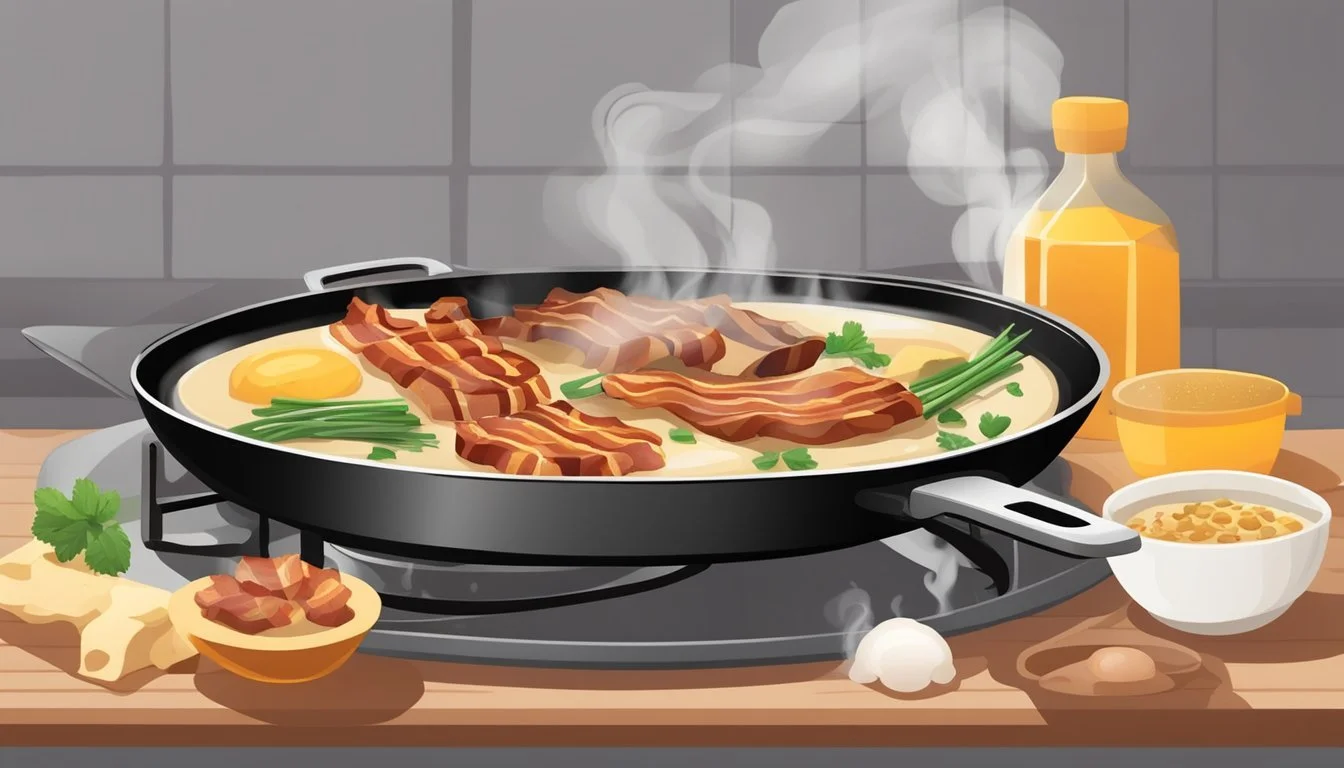Bacon Fat Substitutes
Healthier Options for Cooking
For those looking to reduce their intake of bacon fat without sacrificing flavor, there are multiple healthier alternatives. Olive oil stands out as an excellent plant-based substitute for bacon fat, perfect for individuals seeking to minimize trans-fats and cholesterol while still enjoying a rich taste. This makes it an ideal option for Italian recipes and other dishes requiring a flavorful fat.
Animal-based substitutes are also effective for those who don't mind using animal products in their cooking. Chicken fat, also known as Schmaltz, offers a similar consistency to bacon fat and provides a savory flavor that works well in a variety of dishes, such as roasted potatoes and gravies. Pork lard is another great option, closely related to bacon fat, and can be easily rendered at home or purchased, making it a versatile and tasty choice.
For those craving the smoky and savory essence of bacon fat but following a vegetarian or vegan lifestyle, substitutes like Tofurky, made from tempeh, and carrot bacon using a marinade of soy sauce and liquid smoke can give dishes the desired flavor profile. These options not only cater to different lifestyle choices but also provide a way to enjoy similar tastes without using traditional bacon fat.
Understanding Bacon Fat
Bacon fat, also known as bacon grease or bacon drippings, is a flavorful byproduct of cooking bacon. It is prized for its unique properties and used in various culinary applications. It offers a rich, salty, and umami flavor, adding depth to numerous dishes.
Properties and Uses
Bacon fat has a rich, savory taste with a distinctive salty and umami profile. When heated, it transforms into a liquid, making it versatile for cooking.
Crispy texture: It imparts a crispy texture to foods cooked in it, such as fried potatoes and eggs.
Roasting and sautéing: It's commonly used for roasting vegetables and sautéing greens, where it adds a unique flavor dimension.
Baking: Some bakers even use it in pie crusts and biscuits to introduce a hint of smokiness.
Storage: Bacon fat can be stored in a jar and kept refrigerated for months, maintaining its usability in various recipes.
Substitutes: For those looking for alternatives, options include other animal fats like duck fat and chicken fat, as well as vegetable oils such as olive oil and avocado oil.
Nutritional Value
Bacon fat is primarily comprised of fat, offering a concentrated source of calories.
Fats: It contains both saturated and unsaturated fats. Saturated fats make it solid at room temperature, while unsaturated fats offer some health benefits.
Calories: A single tablespoon of bacon fat contains approximately 115 calories.
Micronutrients: It also has trace amounts of micronutrients, like Vitamin D, but it is not a significant source.
Cholesterol and Sodium: While it provides a rich flavor, bacon fat is high in cholesterol and sodium, so it should be used in moderation, particularly for those monitoring their heart health.
When used wisely, it can be a delicious addition to an array of dishes.
Dairy-Based Substitutes
Dairy-based substitutes for bacon fat include butter and its variants, which are praised for their rich flavors and versatility. These alternatives bring specific benefits and considerations regarding cooking temperatures and nutritional content.
Butter Alternatives
Butter: Butter is a versatile substitute with a creamy texture and rich flavor. It is suitable for baking, sautéing, and roasting. However, butter has a lower smoke point (302°F/150°C), meaning it can burn easily at high temperatures. It is rich in calories and provides essential vitamins like A and D.
Ghee (Clarified Butter): Ghee, also known as clarified butter, is a dairy-based substitute with a higher smoke point (465°F/240°C). This makes it ideal for frying and sautéing without burning. Ghee offers a nutty flavor and retains vitamins like A, D, and E while being lower in protein compared to whole butter.
Below is a comparison table for easy reference:
Substitute Smoke Point Use Cases Key Nutrients Butter 302°F (150°C) Baking, sautéing Vitamins A, D, high calories Ghee 465°F (240°C) Frying, sautéing Vitamins A, D, E, moderate calories
Plant-Based Oils
Plant-based oils can effectively replace bacon fat in many culinary applications. They provide a variety of flavors and cooking characteristics, catering to diverse dietary preferences.
Olive Oil as a Substitute
Olive oil is a versatile substitute for bacon fat. It is rich in monounsaturated fats, which are known for their health benefits. Suitable for frying, sautéing, and roasting, olive oil imparts a mild, slightly fruity flavor that complements many dishes.
Extra virgin olive oil works best for dressings and low-heat cooking, while regular olive oil can handle higher temperatures. Olive oil is not only a healthier choice but also adds depth to Mediterranean dishes, salads, and vegetable-based recipes.
Tropical Oils
Coconut oil and avocado oil are popular tropical oils used as substitutes for bacon fat. Coconut oil adds a subtle sweetness and is excellent for curries and baked goods. Its high smoke point makes it suitable for frying and roasting. Be mindful of its distinct coconut flavor, which might not suit all dishes.
Avocado oil, with its neutral flavor and high smoke point, is ideal for both high-heat cooking and dressings. It is also rich in monounsaturated fats, making it a healthy choice. Avocado oil is perfect for grilling, sautéing, and making mayonnaise.
Sesame Oil: A Distinct Flavor
Sesame oil offers a nutty, rich flavor that can elevate stir-fries, marinades, and sauces. It is widely used in Asian cuisine due to its unique taste and aroma. There are two main types: light sesame oil, which is suitable for frying and cooking, and toasted sesame oil, which is best used as a finishing oil.
Toasted sesame oil should be added at the end of cooking to preserve its flavor. Sesame oil not only substitutes for bacon fat in certain dishes but also enhances their flavor profile with its distinct, aromatic quality.
Vegan and Vegetarian Substitutes
In the realm of plant-based cooking, several options effectively substitute bacon fat without compromising on flavor or texture. Options like tempeh, tofu, mushrooms, and eggplant are popular choices among vegans and vegetarians.
Tempeh and Tofu
Tempeh and tofu are stalwarts in vegan and vegetarian diets. Tempeh, made from fermented soybeans, has a firm texture and naturally nutty flavor. It's often marinated in a mix of soy sauce, maple syrup, and smoked paprika, then pan-fried or baked until crispy. Tofurky products, made from tempeh, are seasoned with additional ingredients like soy sauce and cider vinegar for extra flavor.
Firm tofu, on the other hand, is another versatile option. When seasoned and cooked properly, it can mimic the flavor and crunchy texture of bacon. A popular preparation method includes marinating tofu in a blend of soy sauce, maple syrup, liquid smoke, and smoked paprika before baking or frying it.
Mushroom Variants
Mushrooms offer a meaty and umami-rich alternative to bacon fat. Shiitake mushrooms are particularly popular due to their dense texture and deep flavor profile. To prepare mushroom bacon, slice shiitake mushrooms and marinate them in a combination of olive oil, soy sauce, and smoked paprika. Bake them until they are crispy.
Another variety, portobello mushrooms, can be used similarly. Their large caps can be sliced thin and marinated to create a rich, smoky flavor. This method works well in dishes that require a substantial, chewy texture similar to bacon.
Eggplant for Smokiness
Eggplant is a less conventional but highly effective substitute. Its naturally absorbent texture allows it to take on bold flavors when marinated. To make eggplant bacon, slice the eggplant thinly and marinate it in a mixture of soy sauce, liquid smoke, and maple syrup. Baking these slices until they are crisp brings out a smoky, savory flavor.
Eggplant can also be air-fried for a quicker preparation time, making it a versatile option for those seeking a meat-free bacon alternative. The result is a crispy, flavorful addition that works well in salads, sandwiches, or as a standalone snack.
Animal-Derived Alternatives
When considering alternatives to bacon fat, it's possible to opt for other animal-based fats that provide rich flavors and versatility in cooking.
Lard and Tallow
Lard, which is rendered pork fat, offers a smooth texture and a neutral flavor suitable for a range of dishes. Pork lard is commonly used for baking and frying due to its high smoke point and ability to create flaky pastries.
Beef tallow is another option, rendered from beef fat. It's particularly useful for deep frying and roasting, where its robust flavor can enhance the richness of meats and vegetables. Beef tallow's high smoke point makes it ideal for high-temperature cooking, offering a flavor profile that can elevate savory dishes.
Poultry-Based Fats
Chicken fat, or schmaltz, is sourced from chicken skin and is a staple in various traditional recipes. Its smooth and rich flavor makes it perfect for sautéing vegetables or adding depth to soups and stews. Schmaltz can also be used as a spread or a base for gravies.
Duck fat is another superior alternative, renowned for its ability to create crispy textures in roasted vegetables and meats. It has a unique, savory flavor that enhances dishes like confit and roasted potatoes. Turkey bacon grease, though leaner, can be used similarly to traditional pork bacon fat, offering a lighter, yet still savory, option for sautéing and frying.
Each of these animal-derived fats can serve as a versatile substitute for bacon fat, providing both traditional and unique flavors to enhance various recipes.
Specialty Substitutes
Specialty substitutes for bacon fat cater to specific culinary needs, cultural preferences, and dietary restrictions. These alternatives ensure that cooking remains flavorful and inclusive.
Culinary Essences
Liquid Smoke and smoked paprika are excellent for imparting that signature smoky flavor often associated with bacon fat. Liquid Smoke, a concentrated seasoning, can be added in small amounts to oils or sauces. Smoked paprika provides a similar smoky depth and works well in dry rubs, soups, and stews.
Duck bacon offers a rich and distinct flavor and can be an indulgent substitute. Duck bacon has lower fat content than traditional bacon but provides a similar texture and taste profile, making it perfect for gourmet dishes.
Cultural Considerations
Kosher and Halal dietary laws prohibit pork, necessitating alternatives. Chicken fat (schmaltz) and duck fat are great options, as they comply with these requirements. Schmaltz, popular in Jewish cuisine, provides a savory flavor and works well in traditional recipes.
For those following a vegan diet, vegan bacon grease is available. Typically made from oils like coconut or vegetable oil with added flavorings, it replicates the cooking properties of bacon fat while being plant-based. These alternatives ensure that dishes remain tasty and adhere to ethical and dietary guidelines.
Considerations for Cooking and Baking
When choosing a bacon fat substitute, it's essential to consider the texture it will bring to your dishes. From achieving a crispy finish on grilled items to ensuring the flavor integrity of your casseroles, the choice of substitute has a significant impact.
Maintaining Texture
Bacon fat contributes a crispy, rich texture that can enhance various dishes. To replicate this, olive oil is an excellent plant-based alternative. It provides healthy fats with a smoother texture, suitable for sautéing vegetables or drizzling over salads. For a more similar mouthfeel, chicken fat (schmaltz) offers a semi-solid consistency at room temperature, perfect for roasting potatoes or adding to gravies.
Vegetable oils like canola or sesame oil work well due to their neutral flavors and high smoke points. These oils can help maintain the desired texture without overpowering the primary ingredients. Duck fat and beef tallow are other animal fats that give a rich texture, making them ideal for grilling or as a marinade base. For garnishing salads, crunchy substitutes like roasted chickpeas seasoned with smoky spices can offer the crispy sensation akin to bacon bits.
When used correctly, these substitutes can help you achieve the desired texture in your dishes while keeping the flavors balanced.
Health and Nutritional Aspects
Bacon fat substitutes offer healthier alternatives by providing beneficial fats, proteins, and essential nutrients, ensuring a balanced and nutritious diet.
Healthy Fats
Many bacon fat substitutes include healthy fats that are vital for the body. Avocado and olive oils are rich in monounsaturated fats, which help reduce bad cholesterol levels and lower the risk of heart disease.
Coconut oil offers medium-chain triglycerides (MCTs) that the body rapidly absorbs and uses for energy. Nuts and seeds such as walnuts, flaxseeds, and chia seeds are high in omega-3 fatty acids, promoting brain health and reducing inflammation.
Macronutrients and Micronutrients
Bacon fat substitutes also contain essential macronutrients and micronutrients. Whole soy products like tempeh and tofu provide a high protein content along with vitamins and minerals such as iron and calcium. Mushrooms mimic the umami taste of bacon and are a great source of dietary fiber, selenium, and B vitamins.
Legumes and lentils not only offer protein but are also packed with fiber and essential nutrients like folate, potassium, and magnesium. These options help maintain nutritional balance and contribute to overall health.
Including a variety of these substitutes ensures a well-rounded diet rich in essential nutrients.
Recipe Adaptation and Substitution Tips
Using substitutes for bacon fat can elevate your recipes while accommodating dietary restrictions or preferences. This section offers specific tips for adapting savory and sweet dishes.
Savory Dishes
For those looking to replace bacon fat in savory dishes, olive oil is an excellent plant-based option. It works well for sautéing vegetables and adding depth to Italian dishes. Another great animal fat substitute is chicken fat, or schmaltz, which mimics the consistency and flavor of bacon fat, making it perfect for roasting potatoes or enhancing gravies.
Peanut butter can serve as a unique alternative in certain recipes requiring a nutty flavor profile. For vegan options, consider vegetable shortening which provides the necessary fat content without the animal source. Soy sauce combined with smoked paprika can replicate the smoky flavor associated with bacon fat in many dishes.
Sweet Creations
Surprisingly, bacon fat can also be used in sweet recipes like cookies. When seeking substitutes, butter or vegetable shortening are reliable choices. They ensure similar textures and rich flavors. Adding a touch of peanut butter can introduce a unique twist to cookies or brownies.
For vegan baking, using a combination of coconut oil and maple syrup can achieve a balance of moisture and sweetness. Soy sauce might not be an obvious choice, but in specific caramel-based or smoky-flavored desserts, a very small amount can impart a nuanced depth that complements sweet flavors.










